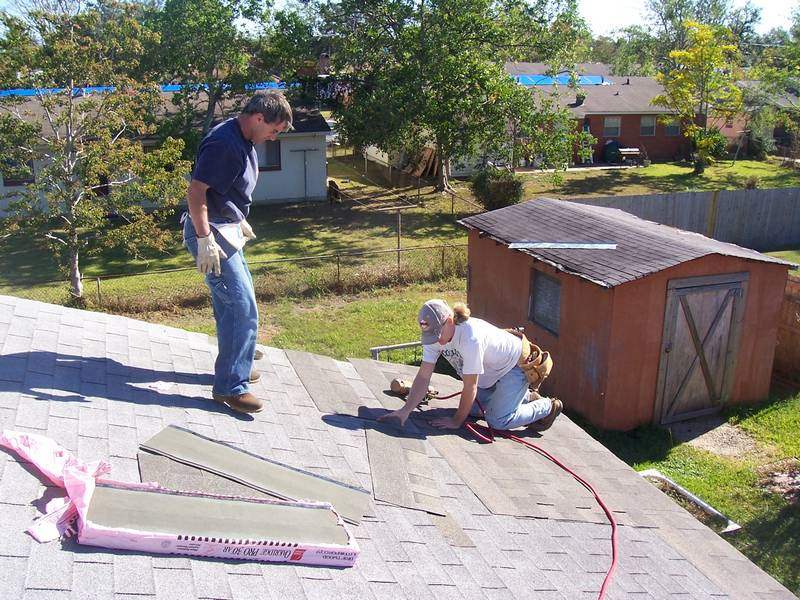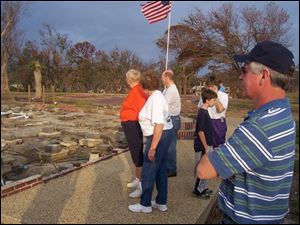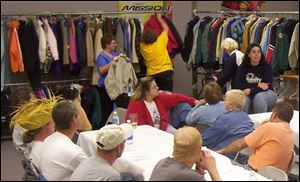
Churches rise up after witnessing wrath of Katrina
12/11/2005
Jeff Neeper, standing, and Greg Buhoveckey of the Toledo area repair a damaged home in Pascagoula, Miss.

The Rev. Dave Watson, right, shows Toledo volunteers where his waterfront home stood.
PASCAGOULA, Miss. - The Rev. Dave Watson stands on the spot where his house used to be, peering from behind dark sunglasses at an uneven slab of concrete.
Scattered about are shards of cement block, red brick, PVC pipe, and metal rebar, with scraps of clothing, rugs, and plastic bags fluttering in the trees. The only structure still standing is a round brick-and-cement staircase, leading to a house that vanished in Hurricane Katrina.
The impeccably dressed pastor, wearing a Polo-brand golf shirt and cap and pressed khaki slacks, doesn't talk much about his former house. His concern is the impact Katrina is having on his ministry and his church.
"God has shaken my world. God just blew it apart with Katrina - literally and spiritually," Mr. Watson said. "He just blew it apart, and He blew open a powerful door of ministry."
His church, Liberty Assembly of God in Gautier, Miss., four miles west of here, survived Katrina's 150-mph winds intact and was safely out of range of its fearsome 30-foot storm surge. But the building was permanently altered by the Aug. 29 hurricane.
In the fellowship hall, where members used to gather for meals and social events, the folding tables are stacked high with supplies of canned vegetables and fruit, diapers and toilet paper, bottled water and juice, blankets and sleeping bags. The Sunday school rooms overflow with donated clothing, sorted according to size and gender.
"The first supplies arrived two or three days after the storm, when a church in Florida sent gasoline, food, clothing, and other essentials," Mr. Watson said. "I was just amazed at the help from the body of Christ. They didn't ask if we were Assemblies of God or if we were Nazarene or what have you. It didn't matter. It wasn't important."
A group of 23 from Toledo's Calvary Assembly of God went to Mississippi earlier this month to help residents repair their storm-damaged homes. During the mission trip, a number of Gulf Coast clergy described how Katrina has forced them to reassess the way they view their lives, their ministries, and the role of religion in society.
"The hurricane has reinforced my vocation, if you will," said the Rev. Mike Kelleher, pastor of Sacred Heart Catholic Church in Pascagoula.
"Now, more than ever, the minister-priest is there to be a witness to the people who are hurting."
Along with the supplies, many churches from around the country offered to send workers to help their hurricane-ravaged counterparts.
"I just said, 'Yes, please come. We need you,' " Pastor Watson said. "Absolutely astounding" is how he described the volunteers who "came together and said, 'Let's go to work. Where do you need me? What can we do?' We were amazed and almost stunned at what we were seeing and hearing."
Father Kelleher pointed out that many Gulf Coast clergy "are all dealing with personal problems. My home was washed away in a matter of half an hour. I barely escaped with my life. But it's OK. We'll get beyond it.
"We enter this world with nothing, and we'll leave it with nothing. If you get caught up with material possessions, then you're on the wrong track. ... It's kind of like being reborn."
Pascagoula, a blue-collar port city of 26,000 about half an hour from the Alabama border, missed the full brunt of Katrina, which slammed head-on into Biloxi, Gulfport, and Waveland, Miss., to the west. But while the damage in Pascagoula is less obvious than in those decimated areas, it's still widespread and almost overwhelming.
Many of Pascagoula's waterfront homes were washed away or smashed to pieces, but even houses two miles from shore were damaged by floodwaters and torrential rains that poured through wind-torn roofs.

Jeff Neeper, standing, and Greg Buhoveckey of the Toledo area repair a damaged home in Pascagoula, Miss.
Thousands of homes remain uninhabitable, their owners living in "FEMA trailers" delivered to their lots by the Federal Emergency Management Agency. Evidence of the flood remains everywhere.
Outside Victory Praise and Worship Church of the Nazarene, a 14-foot fishing boat lies on the sidewalk, leaning against a side entrance.
Member Darlene Hyde said the boat ferried a family from their flooded home to safety at the church, and the boat was left there after the water receded.
Ms. Hyde and Alma Holloway sat outside their church on a recent sunny day, waiting for their pastor to return with building supplies. They didn't know what the task would be, but they were ready to do whatever they could.
Their church has benefited from volunteer help by church groups as far away as Washington state, Ms. Holloway said.
"The storm taught me to listen and pay attention to what God is doing, because He ain't pleased," Ms. Hyde said. "He wants us to get it right."
At Pascagoula's Salvation Army Church, Sgt. Brett Cundiff and his wife, Sgt. Kim Cundiff, were busy unloading supplies from a 40-foot tractor-trailer.
"Normally during a storm, the Salvation Army takes center stage," Sgt. Brett Cundiff said. "But the damage from Katrina was so widespread that every church has been doing something."
He said Pascagoula experienced "a diaspora" from the storm, with many residents still not back after seeking refuge with distant relatives. "Church attendance is down because of it, but I haven't seen people turn against God," he said.
His wife said their church has been strengthened because the people have worked together, helping one another and teaming up to help others in need.
"What we've gained has far outweighed the losses," Sgt. Kim Cundiff said. "We lost material things, but we've learned to lean on God for everything. It's brought us closer together as a family."
In the immediate aftermath of Katrina, when the New Orleans levees broke and the city was wracked by floods, riots, and chaos, many Mississippians felt forsaken. "All you heard on the news was 'New Orleans, New Orleans, New Orleans,' " said Joe Dunbar, 58, of Pascagoula. "People here were mad: 'What about Mississippi? This is where the hurricane hit.' "
Three months after the initial disaster, laborers - whether paid or volunteer - are scarce. Help-wanted signs are everywhere, and fast-food restaurants are offering $10 an hour, nearly double the federal minimum wage, to lure workers.
"The main problem now is finding somebody to do this work," said Mr. Dunbar, living in a trailer with a welcome mat that reads: "So it's not home sweet home - adjust!"
Volunteers from churches and nonprofit groups around the country have come to Pascagoula bearing tools, know-how, and compassion. Their motivation is to simply to help those in need and to put their faith into action.
The team of 23 from Toledo's Calvary Assembly of God - some retired, others taking vacation time - drove 16 hours each way, jammed shoulder-to-shoulder in two vans.
Calvary's women slept in the rectory of the Escatawba Assembly of God Church, where volunteers have nearly finished renovating the building that had been flooded by four feet of seawater. The men in the Toledo crew slept on the church's concrete floor or wooden altar platform, and took cold showers for the first two days of the trip until the water heater was fixed.

Members of Toledo's Calvary Assembly of God gather for services in Liberty Assembly of God in Gautier, Miss. The church survived Katrina's winds intact.
Greg Buhoveckey, 29, a civil engineer from Swanton, decided to take a week off and help "because I've done that kind of work before and I just felt like I needed to go."
Mr. Buhoveckey said it wasn't until he got home that he reflected on the work accomplished in Pascagoula.
"While we were there, I was kind of focused on what needed to be done, and just getting it done," he said. "Now I realize how much work we did and what we accomplished - and how much fun we had at the same time."
Marti Adams, 64, a Perrysburg nurse, wanted to go "spread some love around" and help however she could. She and her sister, Ruby Moore, were concerned beforehand that they might not be able to help with all the physical labor that was needed. But they kept busy the whole time by painting walls at Liberty Assembly of God, handing out clothes to the needy, cutting roof shingles, and taking care of numerous odd jobs.
"We were the helpers," she said. "I knew God wouldn't just send us down there to sit around. Plus I got to pray with the people and love the people. The trip really strengthened my faith. I'd go back in a minute."
In a little over 3 1/2 days of work, getting up at 5:30 a.m. and continuing into the night, the Toledo crews replaced the entire roofs of two houses - one belonging to a widow and the other to a single mother - and hung new walls and ceilings in two other homes.
"The church workers make all the difference in the world," Mr. Dunbar said while the Toledo crew was hanging drywall. "Their time is limited. They might only be able to work for a day or two, but all the help is appreciated."
Throughout the Gulf Coast, vans sporting church logos arrive almost daily, and volunteers wave and smile at one another as they pass.
Most of the crews make their way to Lowe's, the largest building supply store in Pascagoula and Gautier, where they load up with lumber, drywall, and roof shingles.
In Gautier (pronounced GO-shay), three FEMA employees sat at a table right inside Lowe's entrance, where they helped homeowners in getting government assistance.
"We counsel 65 to 100 people a day," said Mike Toche, leader of FEMA's Gautier outreach team. "We try to educate people on rebuilding. I wouldn't say that most of them are angry, but they come in, they have problems, they may get a little excited. Our job is to find out where they are in the FEMA process."
Only about 7 percent of Gulf Coast residents had flood insurance, and funds from FEMA and other government agencies usually cover just a fraction of the costs of the storm damage.
Mr. Toche said volunteers from churches and nonprofit groups help bridge the gap between government assistance and residents' immediate needs. He said FEMA will refer many widows, single mothers, elderly, and handicapped people to churches for help in removing debris and rebuilding their homes.
"The volunteers are on the spot, helping people. We see them all - Methodists, Baptists, Presbyterian, Catholics," he said.
Debbie Lawrence, 42, of Pascagoula, is one of those who received help from a number of church volunteer teams, including Toledo's Calvary Assembly of God. The Toledoans stripped down her 4000-square-foot roof to bare wood, replaced damaged joists and plywood, then covered it with tar paper and new shingles.
"It has been awesome," said Ms. Lawrence, a church secretary and a single mother of four. She climbed a ladder to take a close look at her new roof and wiped away tears.
She said her home sustained more than $60,000 in damage from wind, rain, and flooding, but she qualified for only $14,000 in government assistance.
"I honestly didn't know how I was going to get my house back together with the amount of money I had," Ms. Lawrence said. "The volunteer workers have amazed and encouraged me so much. This is truly God working through everyone who has come down here. It would have taken me years to rebuild."
Such hands-on, practical help in putting a roof over people's heads is exactly what Pastor Watson is looking to provide in a post-Katrina world.
In addition to distributing food and supplies to the needy, the 47-year-old minister has canceled Wednesday night services indefinitely and urged church members to spend their time helping hurricane victims instead.
Outside Gautier Presbyterian Church, a dozen or so tents were lined up on church property to provide temporary quarters for volunteers from around the United States. Up to 2,000 volunteers have traveled there to help storm victims. Those relief efforts are coordinated by the national office of Presbyterian Disaster Assistance.
Steve Leisenring, 21, manager of the Gautier disaster assistance camp, left his home in San Clemente, Calif., to spend two months in Mississippi. He downplayed the crutches he leaned on, the result of a nail that went into his knee.
"These things happen," he said. "It's no big deal."
He said he is glad to volunteer his time in the rebuilding effort and estimated it will take five to 10 years before the region is back to full strength.
"It's a calling," he said of his motive for coming to Gautier. "And it has been so fulfilling in every way. Even the demolition work, think about it: You get to knock down walls with a jackhammer and use chain saws to cut things up. And you don't get in any trouble for it."
Beyond reconstruction work, the Gautier Presbyterian crews have been providing food and meals to storm victims.
"It's a very coordinated effort," said the Rev. Chris Bullock, pastor of Gautier Presbyterian. "The volunteers run a food pantry, they install Sheetrock in houses, muck the walls, do the plumbing and roofing. I think there are a lot of outreach opportunities here."
Mr. Bullock said the hurricane has had an immeasurable, if undefined, impact on his ministry.
"I don't know how, but Katrina has permanently affected the way life works in the faith community down here," he said. "It's shaken it up. I'm still trying to figure it all out."
Mr. Watson said he was already feeling a sense of restlessness before Katrina. He wanted to do more to reach people outside of the usual church crowd. When the hurricane hit, it showed him ways to put his faith into action.
"I knew the need was there, but I didn't really see it until Katrina," he said. "Now I'm seeing the ministry impacting people. When you see a family who has nothing come into the church - maybe they're sleeping under a garage or on a porch or in a tent - and they come into the church and they see sleeping bags, they see food, they see the everyday things of life we take for granted, and their faces just light up. They say, 'Oh, praise God, I get a box of Post Raisin Bran cereal! We get some wonderful paper towels here that stay together after one swipe.' ... They're smiling, and so I'm smiling. It makes them happy, so it makes me happy."
He wants to create a sense of action and the feeling of excitement that he reads about in the New Testament church, he said.
"We're good at talking about church, but we're not being the church. And that's a tremendous difference there," Mr. Watson said.
Providing food and supplies to those who lost everything in the hurricane is one way of putting faith into action, he said. He has helped build churches and schools in Africa but said it is "doubly rewarding" to be able to help people in the United States and in his hometown.
He now has a vision for Liberty Assembly of God to build a facility that has a warehouse for stockpiling supplies, sleeping quarters for volunteers who come to help rebuild, and a kitchen to cook meals for the needy. The facility would provide help to the community long after Hurricane Katrina's damage is repaired.
"We're moving from a passive faith to an active faith, and things are not going to be the same anymore," Mr. Watson said. "It's going to be different. Our church has a new face and it has a new spirit and it has a new atmosphere about it. We're reaching people and it's fun ... For the first time in my life, I feel like I've really started pastoring."
Contact David Yonke at: dyonke@theblade.com or 419-724-6154.